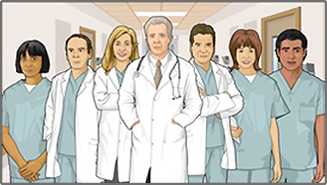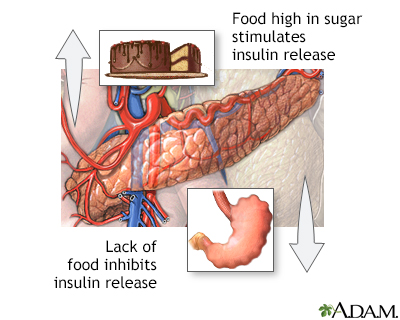Drug-induced low blood sugar
Drug-induced low blood sugar is low blood glucose that results from taking medicine.
Low blood sugar
Low blood sugar is a condition that occurs when the body's blood sugar (glucose) decreases and is too low. Blood sugar below 70 mg/dL (3. 9 mmol/L) i...

Causes
Low blood sugar (hypoglycemia) is common in people with diabetes who are taking insulin or other medicines to control their diabetes.
Low blood sugar
Low blood sugar is a condition that occurs when the body's blood sugar (glucose) decreases and is too low. Blood sugar below 70 mg/dL (3. 9 mmol/L) i...

Other than certain medicines, the following can also cause blood sugar (glucose) level to drop:
- Drinking alcohol
- Getting more activity than usual
- Intentionally or unintentionally overdosing on the medicines used to treat diabetes
- Missing meals
Even when diabetes is managed very carefully, the medicines used to treat diabetes can result in drug-induced low blood sugar. The condition may also occur when someone without diabetes takes a medicine used to treat diabetes. In rare cases, non-diabetes-related medicines can cause low blood sugar.
Medicines that can cause drug-induced low blood sugar include:
- Beta-blockers (such as atenolol, or propranolol overdose)
- Cibenzoline and quinidine (heart arrhythmia medicines)
- Glinides (such as nateglinide and repaglinide)
- Indomethacin (a pain reliever)
- Insulin
- Metformin when used with sulfonylureas
- SGLT2 inhibitors (such as canagliflozin, dapagliflozin, empagliflozin and ertugliflozin) with or without sulfonylureas
- Sulfonylureas (such as glipizide, glimepiride, glyburide)
- Thiazolidinediones (such as pioglitazone and rosiglitazone) when used with sulfonylureas
- Drugs that fight infections (such as gatifloxacin, levofloxacin, pentamidine, quinine, trimethoprim-sulfamethoxazole)
Reviewed By
Laura J. Martin, MD, MPH, ABIM Board Certified in Internal Medicine and Hospice and Palliative Medicine, Atlanta, GA. Also reviewed by David C. Dugdale, MD, Medical Director, Brenda Conaway, Editorial Director, and the A.D.A.M. Editorial team.
Hussain K. Hypoglycemia. In: Goldman L, Cooney KA, eds. Goldman-Cecil Medicine. 27th ed. Philadelphia, PA: Elsevier; 2024:chap 211.




